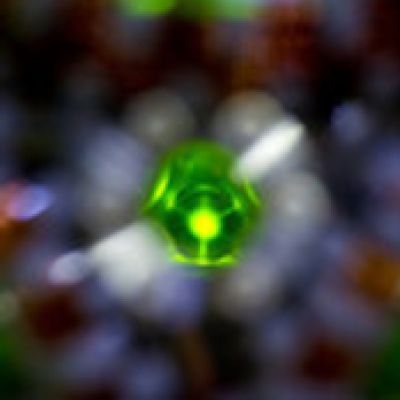Hear the latest news about everything from quantum computers to astrophysics, all straight from scientists at the University of Maryland.
https://hub.jqi.umd.edu/
Gesamtlänge aller Episoden: 15 hours 6 minutes
Quantum-Safe Algorithms Face Off in NIST’s Cryptography Showdown
While browsing the web, you might not realize that the security of your online transactions is guaranteed by a hard-to-crack math problem called factoring. But this security could evaporate in an instant—if a big enough quantum computer is built. Computers that store information in quantum hardware—like individual ions, atoms or photons—would make quick work of the factoring problem and threaten the safety of current protocols...
Science in Quarantine: A Rush to Go Remote
In this episode, we look back at the early days of the COVID-19 pandemic, when impending lab closures were threatening scientific progress and graduate student careers. We sit down with Laird Egan, then a graduate student in physics at JQI, and hear about how he and his lab mates managed to turn their ion-based quantum computer into a remote-controlled experiment in a matter of weeks. We also learn how they used their newly remote lab to achieve a milestone in quantum computing...
Diamonds Are a Quantum Sensing Scientist’s Best Friend
We all know that diamonds can hold great sentimental (and monetary) value. As luck may have it, diamonds—particularly defective ones, with little errors in their crystal structure—also hold great scientific value. The defects have properties that can only be described by quantum mechanics, and researchers are working on harnessing these properties to pick up on tiny signals coming from individual biological cells...
The Secrets Atoms Hold, Part 2: Gravity
Gravity is a fixture of our everyday lives, particularly apparent when we drop a piece of toast on the kitchen floor or trip over an unseen step. Not surprisingly, physicists have studied gravity heavily over the centuries. The best take to date is Einstein’s theory of general relativity, which has been confirmed by every observation to date.And yet, the theory of general relativity is incompatible with our best understanding of the microscopic world—quantum mechanics...
The Secrets Atoms Hold, Part 1: Search for Dark Matter
There’s a big unsolved mystery in physics: The cosmic balance sheet for matter in our universe just doesn’t add up. Galaxies all over space move as though they are much heavier than they appear. Scientists postulate that they are full of stuff we cannot see, stuff that they call dark matter.To figure out what that stuff might be, scientists have turned their attention to atoms, which are familiar, well-understood, and in abundant supply right here on Earth...
Donuts, Donut Holes and Topological Superconductors
Topology—the mathematical study of shapes that describes how a donut differs from a donut hole—has turned out to be remarkably relevant to understanding our physical world. For decades, it’s captured the hearts and minds of physicists, who have spent that time uncovering just how deep the connection between topology and physics runs. Among many other things, they’ve unearthed a prediction, born of topology, for a new particle with promising applications to quantum computing...
Labs IRL: A Craving for Code
Software just might be the unsung hero of physics labs. In this episode of Relatively Certain, Dina sits down with JQI postdoctoral researcher and programming aficionado Chris Billington to talk about his passion project—a piece of experimental control software that’s gaining popularity in labs here at the University of Maryland and around the world.The tool, called labscript, is a testament to the strengths of open source programming...
Taming chaos with physics and AI
In many situations, chaos makes it nearly impossible to predict what will happen next. Nowhere is this more apparent than in weather forecasts, which are notorious for their unreliability. But the clever application of artificial intelligence can help reign in some chaotic systems, making them more predictable than ever before...
Black holes: The ultimate cosmic whisks
Chaos. Time travel. Quantum entanglement. Each may play a role in figuring out whether black holes are the universe’s ultimate information scramblers.In this episode of Relatively Certain, Chris sits down with Brian Swingle, a QuICS Fellow and assistant professor of physics at UMD, to learn about some of the latest theoretical research on black holes—and how experiments to test some of these theories are getting tantalizingly close...
Life at the edge of the world
What's it like living and working in Antarctica? Upon returning from a five-week trip to the Amundsen-Scott South Pole Station, UMD graduate student Liz Friedman sat down with Chris and Emily to chat about her experience. In this episode, Friedman shares some of her memories of station life and explains how plans at the pole don't always pan out.This episode of Relatively Certain was produced by Chris Cesare, Emily Edwards and Dina Genkina. It features music by Dave Depper...
